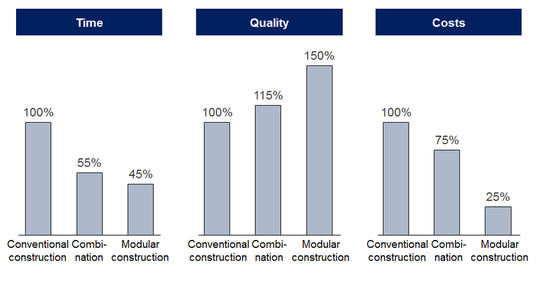Modularisation in Housing
[03.04.2017]

Affordable housing is increasing globally, demanding high-quality and low-cost constructions
The global population is constantly growing. Rising economies have to handle a radical and ongoing urbanization in places all over the world. As a consequence of this development, governments from many nations are in need of sustainable as well as cost effective living space solutions in urban areas. While conventional construction concepts with concrete as a major building material are quite dull in terms of providing a time and cost effective concept, modern prefab housing concepts are offering a promising solution to that problem.
In order to be able to provide cost effective and simultaneously high quality and luxurious living space concepts, a builder of prefab houses is currently modularising its complete production as well as product structure with the assistance of TCW Management Consulting Munich.
Video: Modularisation in Housing (with subtitles)
Benefits of Modularisation in Housing
In cooperation with the TCW Management Consulting team, the modular housing concept allows to optimize all relevant dimensions of economical and sustainable success. Due to the growing short term demand for adequate housing solutions, the dimension of time is one major aspect for a unique selling proposition of prefab housing solutions. Next to a cost reduction of more than 70 percent, the time dimension can be optimized by more than 55 percent. As a result of the massive lessons learned effect caused by the modularisation, a drastic optimisation in terms of quality can also be realised.

Extending the automotive success story to the housing sector
As in the automotive industry, the housing sector’s customers are quite individual when it comes to deciding how their new living space ought to look like. As a result of this, the individuality of the product structure becomes quite complex, reducing the producer’s possibilities to profit from lessons learned within the value creation process. The Modularisation in Housing concept aims at custom houses that are manufactured industrially with consolidated value adding processes in a factory environment. Due to the high transparency and the planning of the individual process steps, the quality is monitored and improved by means of continuously revolving quality gates. In contrast to the construction site, the error rate is lowered to a minimum under ideal conditions and the quality standards according to 6-Sigma can be achieved. A central administration, spanning all construction trades, reduces the overall processing time for the construction of the house to a minimum. If methods from digitalisation like a product configurator or a building information modelling system are used, they add further value for the customer and support the construction of cost-efficient buildings from the very first idea of the owner to the hand-over of the keys.
A feasibility study presents the scientific foundation and positioning of modularisation in housing
Conventional building methods that predominantly use steel and concrete, and decentralised added value at the building site, are quickly reaching their limits of effectiveness. This mostly occurs due to unstable and fluctuating quality assurance, and the difficulty of coordinating the various building trades involved. In addition, several regions increasingly find themselves without a sufficient number of trained professionals. Modularisation in housing offers an approach to face the challenges posed by building projects. Modular housing combines standardised lightweight modules in an intelligent manner, allowing builders to erect residential buildings in industrialised production and assemble a weatherproof shell within a day. But how can the concept of modularisation be implemented in the housing sector? With the feasibility study builders, planners and architects get an overall concept for the Modularisation in housing. The study outlines the success factors of modularisation and the pay-offs for the customer, which are shown in an economic analysis. The reader gets information about customer preferences in the housing sector and an impression about potential applications for the modular construction as well as additional fields of development i.e. services. A market analysis indicates regions where the concept of modularisation in housing has high potentials.
The English Edition of the feasibility study can be ordered at www.tcw.de/modularisation-in-housing and is also available in German, Russian or Chinese.
Publikationen
- Modularisation in Housing
Studie - Modularisierung im Hausbau
Studie - Modularisierung im Hausbau
Leitfaden zur Produktkonfiguration, Fertigungs- und Baustellenorganisation - Modularisierung im Hausbau - Konzepte, Wirtschaftlichkeit, Marktpotenziale
Tagungsband des 1. Münchner Kolloquiums Modularisierung im Hausbau
